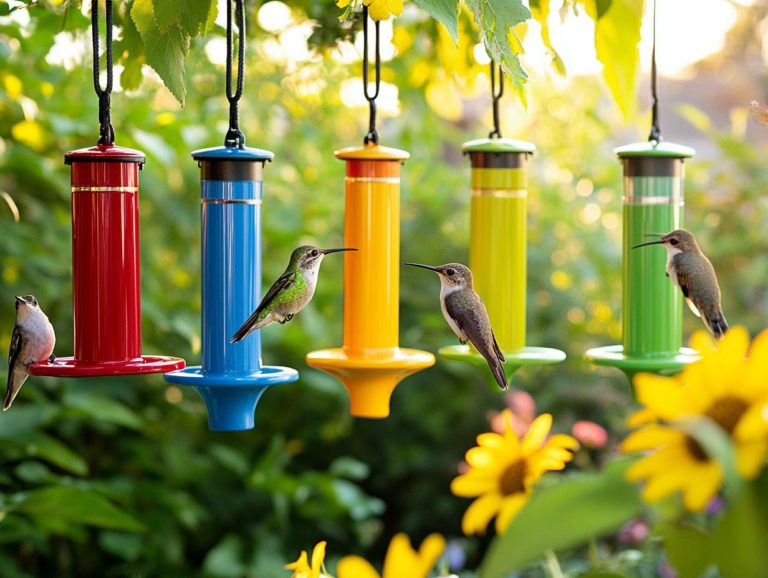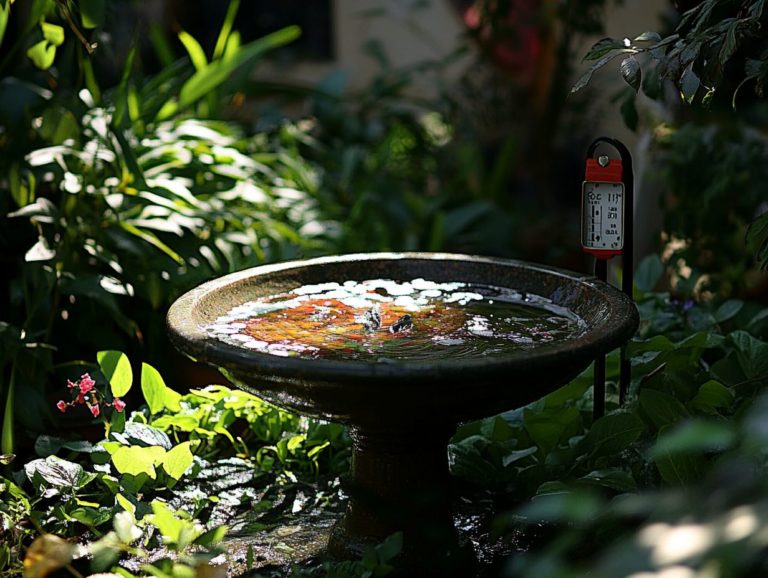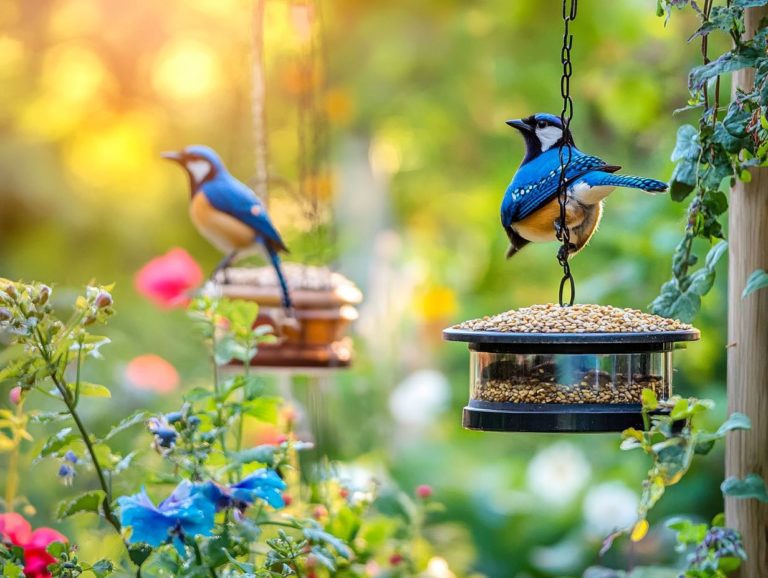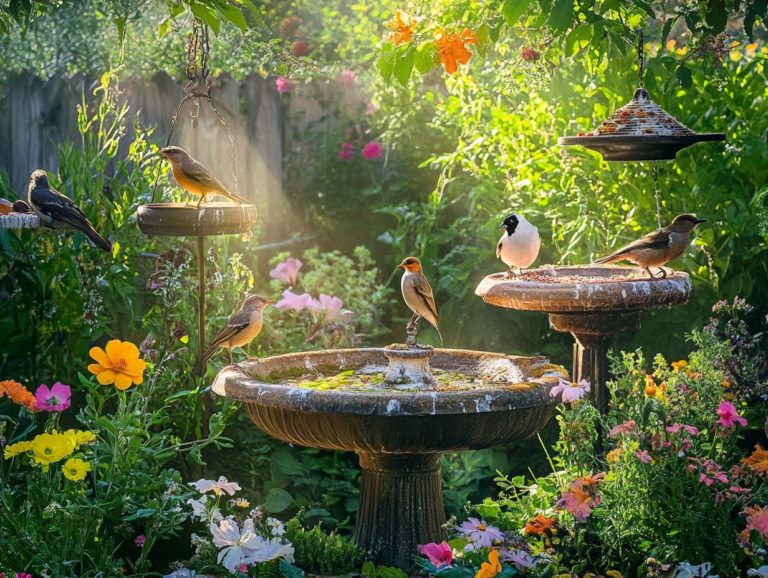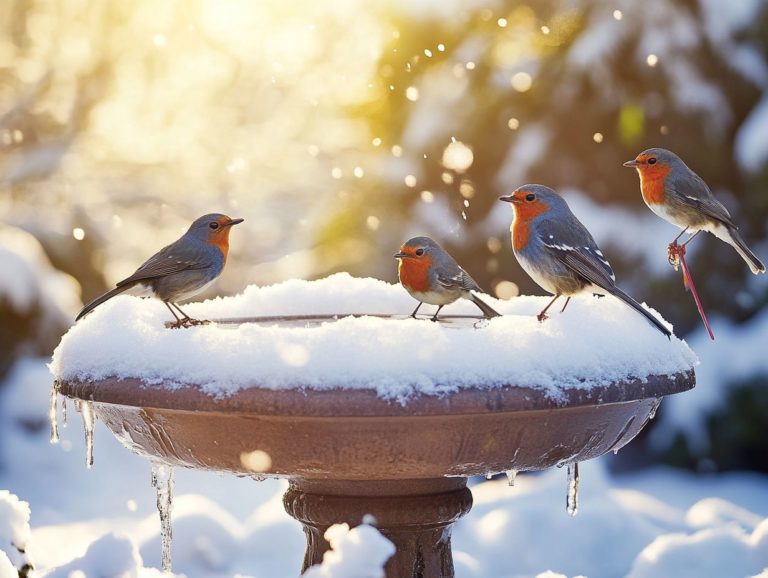Choosing the Right Seed for Your Bird Feeder
Birdwatching is an exciting adventure that brings the beauty of nature right to your backyard. It all begins with selecting the right bird seed to attract your feathered companions.
With many types of bird seeds available, it s crucial to understand which options cater specifically to the diverse species you hope to welcome.
This guide delves into the various types of bird seeds available, outlines key factors to consider when making your selection, and offers tips for identifying top-quality choices.
This guide also features popular seed mixes and effective storage methods. These tips will make your bird feeding experience enjoyable and rewarding.
Contents
- Key Takeaways:
- Types of Bird Seeds
- Factors to Consider When Choosing Bird Seed
- How to Identify Quality Bird Seed
- Popular Bird Seed Mixes and Blends
- Tips for Storing and Handling Bird Seed
- Frequently Asked Questions
- What factors should I consider when choosing the right seed for my bird feeder?
- What types of bird seeds are available for my feeder, including nyjer seeds and birdseed mixes?
- Can I mix different types of seeds in my feeder?
- How should I store my bird seeds?
- What should I do if my birds aren’t eating the seed I’ve chosen?
- Are there any types of seeds that I should avoid putting in my bird feeder?
Key Takeaways:
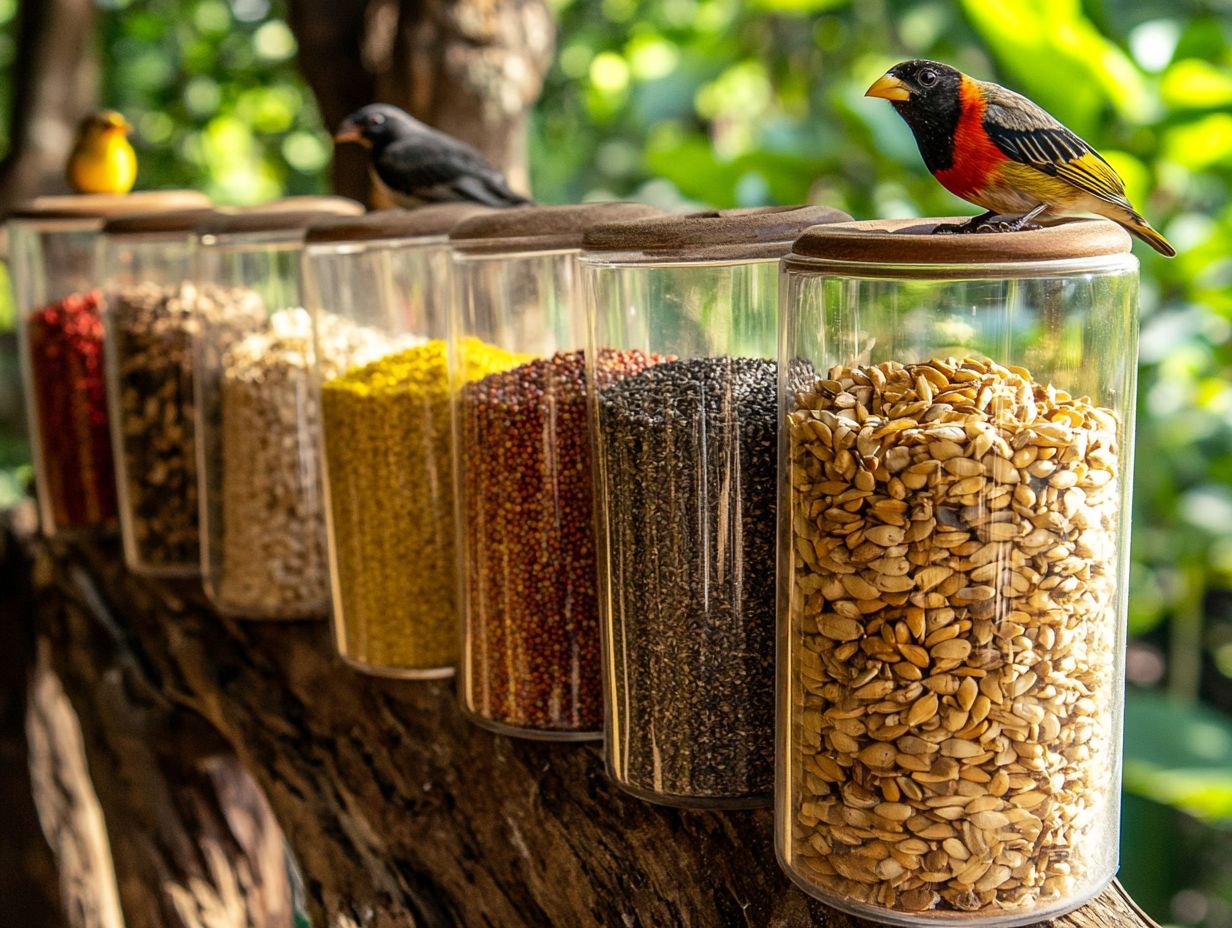
- Consider the type of birds you want to attract and their preferences when choosing bird seed.
- Location and feeder design play a role in selecting the right seed.
- Quality bird seed should be fresh, clean, and free of debris.
Types of Bird Seeds
Understanding the different types of bird seeds is crucial for you as a backyard birding enthusiast eager to attract vibrant feathered friends, such as chickadees, cardinals, and woodpeckers, to your feeders.
Each seed type appeals to various bird species. Sunflower seeds are a beloved choice for many due to their high energy content, while finches particularly enjoy nyjer seeds. Additionally, ground-feeding birds thrive on seeds like white proso millet and golden millet.
Choosing the right bird food is essential. It can greatly increase the variety of birds visiting your backyard habitat.
Overview of Common Seeds
Common seeds used in bird feeding include sunflower seeds, nyjer seeds, and safflower seeds. Each is carefully selected to attract specific bird species to your feeders.
Sunflower seeds are a favorite among many, thanks to their high fat content, which provides a burst of energy for birds like chickadees, cardinals, and finches. Black oil sunflower seeds, with their thin shells and rich oil content, are especially popular among songbirds, delivering essential nutrients they crave.
If you’re looking for versatility, sunflower hearts the hulled version of sunflower seeds are perfect. They attract a wide variety of birds, making them ideal for mixed seed feeders.
Nyjer seeds, tiny black seeds, are particularly appealing to finches, especially goldfinches and siskins. Safflower seeds are a top choice for cardinals and some wrens.
Don t forget about peanuts; they play an essential role too, attracting jays, woodpeckers, and even nuthatches with their protein-rich profile and irresistible flavor.
Factors to Consider When Choosing Bird Seed
When selecting bird seed for your feeding stations, it s essential to consider several factors: the specific bird species you wish to attract, their individual seed preferences, and the local environment where your feeders will be placed.
Choosing the right seed can dramatically enhance your backyard birding experience, and knowing how to choose the right bird feeder ensures that delightful visitors like cardinals and chickadees make regular appearances at your feeders.
Additionally, understanding the design of your feeders and how it relates to the types of seeds you offer can maximize accessibility for various birds while minimizing waste, particularly in areas where squirrels might pose a challenge.
Bird Species and Preferences
Every bird species has unique seed preferences. To enhance your birdwatching experience, learn how to choose a bird feeder for your budget that attracts your desired feathered friends, like chickadees, cardinals, and woodpeckers.
Recognizing these preferences helps you create a welcoming feeding station. For example, finches love nyjer and sunflower seeds for their high oil content, which energizes their playful antics.
Ground-feeding birds, such as sparrows and doves, prefer millet and cracked corn. They often forage on the ground for these easy snacks.
Offering a variety of seeds caters to the habits and tastes of different species. This not only boosts diversity among your feathered visitors but also elevates your overall birdwatching experience.
Location and Feeder Design
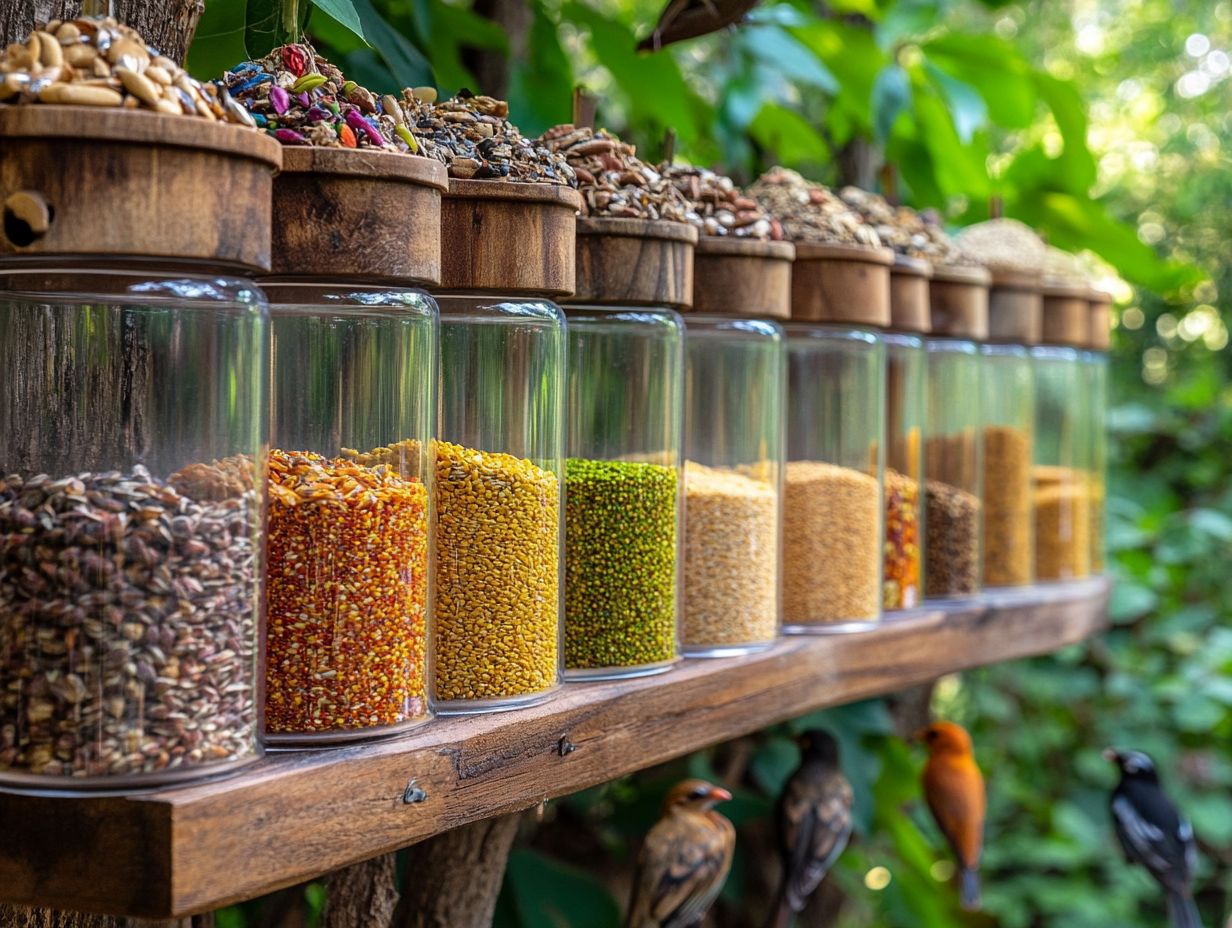
The placement and design of your bird feeders are pivotal in drawing a variety of birds to your backyard. This ensures both accessibility and safety for the feathered visitors.
Position feeders in areas with clear visibility to create a welcoming feeding ground. This will also help birds spot potential threats from afar.
Placing feeders near dense native plants adds protection against predators and provides natural perches.
Incorporating designs like squirrel baffles can effectively keep pesky critters at bay, giving birds easier access to seeds and suet. Suet feeders can attract birds that eat insects, enhancing your backyard’s biodiversity.
Grasping these elements will significantly elevate your efforts in crafting a vibrant, avian-friendly environment.
How to Identify Quality Bird Seed
Identifying quality bird seed is essential for ensuring your backyard feeders are stocked with nutritious food. This attracts and nurtures vibrant bird populations while protecting them from potential seed contamination.
Your bird food strategy should prioritize selecting seeds that are free from dust, mold, and undesirable filler seeds. These often lack nutritional value and can harm birds.
Understanding the key characteristics of high-quality bird seed can greatly enhance your bird feeding experience.
Key Characteristics to Look for
When assessing bird seed, consider key characteristics like nutritional content, freshness, and the absence of harmful contaminants. These elements are vital for the health of the birds that grace your feeders.
Different types of seeds come with their own benefits. For example, sunflower seeds are packed with fats and proteins that fuel energy levels, while millet offers essential vitamins and minerals.
Opt for seed blends enriched with fruits or nuts to enhance the nutritional profile and attract a diverse array of birds.
Be cautious steer clear of seed mixes that include low-quality fillers like sawdust or corn, as these provide minimal nutritional value and could lead to health issues.
Be vigilant about the condition of the seeds. Damaged or moldy seeds can pose serious risks. Proper storage is essential to prevent spoilage and contamination. Keeping seeds fresh will guarantee happy, healthy birds visiting your backyard!
Popular Bird Seed Mixes and Blends
Popular bird seed mixes and blends are crafted to satisfy a range of avian tastes. They offer a balanced diet that draws in multiple bird species and elevates your overall backyard birding experience.
These thoughtfully designed mixes cater to diverse preferences, creating a vibrant atmosphere in your outdoor space. This invites a symphony of birdsong and activity.
Benefits and Uses of Mixes
Birdseed mixes offer numerous benefits. They attract a variety of bird species to your feeders while providing essential nutrients that support their health and energy needs.
By curating these mixes for specific bird types, such as ground-feeding species like doves and juncos, you can create an inviting haven. For instance, adding larger seeds like cracked corn or millet can encourage these ground dwellers to visit your feeding area more often.
Including black oil sunflower seeds will attract various songbirds. Watching them feed enhances your backyard experience and adds delightful entertainment.
A carefully selected variety not only meets the tastes of different species but also fosters a richer ecosystem, bringing vibrant colors and enchanting melodies to your outdoor space.
Tips for Storing and Handling Bird Seed
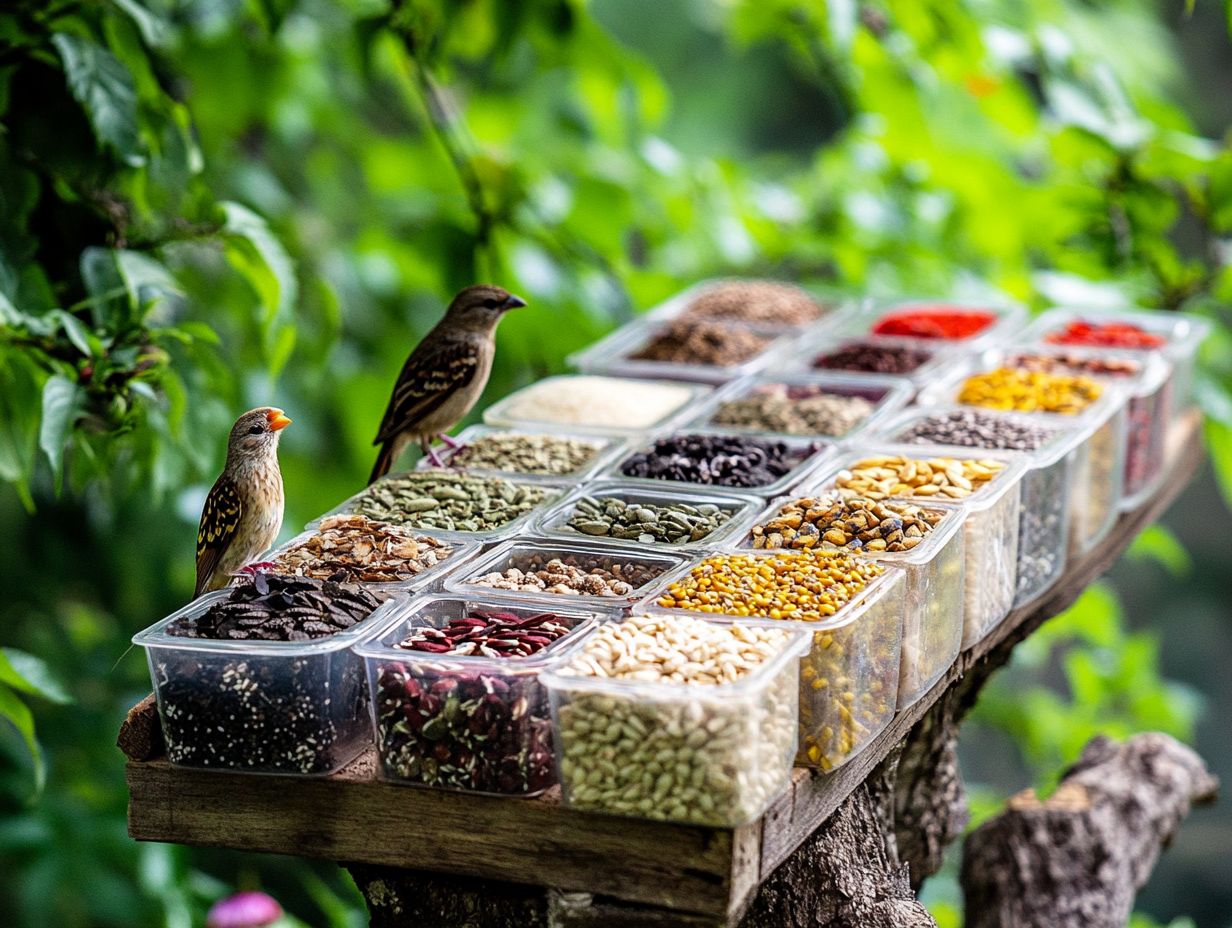
Properly storing and handling bird seed is essential for maintaining its freshness and nutritional value. Proper handling creates a healthy feeding environment for your feathered friends.
Proper Storage Methods
Implementing proper storage methods for birdseed is crucial. It helps maintain quality and prevents spoilage, ensuring that your backyard birds receive the best nutrition.
Use airtight containers made from materials like glass or strong plastic. These materials effectively shield seeds from moisture and pests. Store these containers in a cool, dry place away from direct sunlight, as temperature changes can affect seed viability.
Always check the expiration dates on your birdseed, as freshness can vary by type, whether it’s sunflower seeds or millet. By using older seeds first, you can enhance their diet and keep them thriving.
Precautions for Handling Seed
Taking precautions when handling birdseed is important for preventing contamination. This ensures safe feeding practices, protecting both the birds and the environment.
Always use clean tools and equipment. Residue from non-bird food items can introduce harmful pathogens. Wash and dry feeders, scoops, and storage containers thoroughly to eliminate potential hazards.
Storing birdseed in airtight, sanitized containers helps maintain freshness and keeps pests away. Following safe handling methods creates a nurturing feeding station that promotes the health and well-being of your feathered visitors while minimizing your ecological impact.
Frequently Asked Questions
What factors should I consider when choosing the right seed for my bird feeder?
Consider the type of birds you want to attract, the size of the feeder, and its location. Different birds have varying seed preferences, and some may not access certain feeder sizes or locations.
What types of bird seeds are available for my feeder, including nyjer seeds and birdseed mixes?
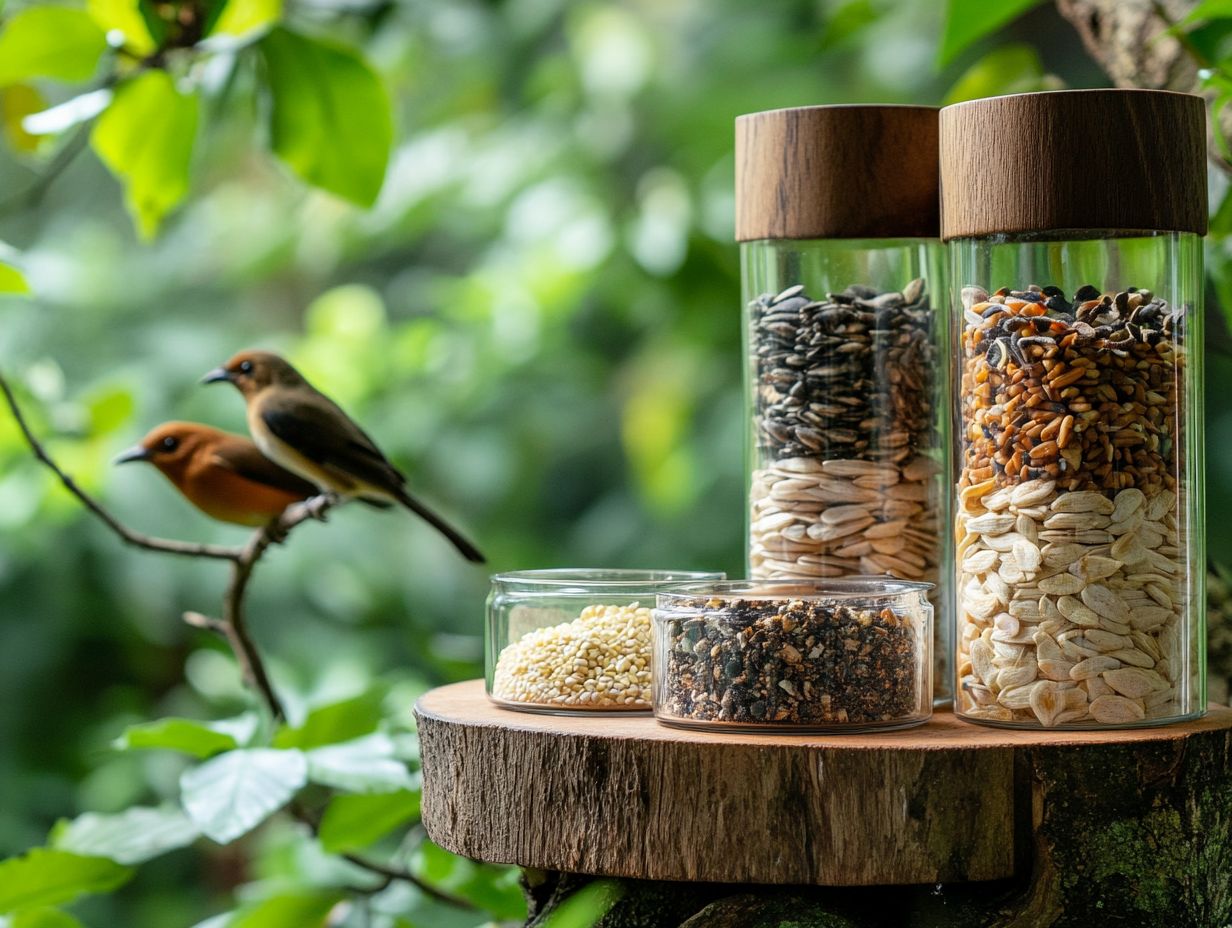
Many bird seeds are available, including sunflower seeds, safflower seeds, millet, and nyjer seeds. Research which types are preferred by the birds in your area.
Can I mix different types of seeds in my feeder?
Yes, mixing different seeds can attract a wider variety of birds and provide them with a more diverse diet. Just be sure to research which seeds work well together.
How should I store my bird seeds?
Store your bird seeds in an airtight container in a cool, dry place. This helps prevent moisture and pests from spoiling the seeds.
What should I do if my birds aren’t eating the seed I’ve chosen?
Is your bird feeder going untouched? Switch to a different seed and see the difference! They may have preferences based on local options or the seed might not be fresh.
Are there any types of seeds that I should avoid putting in my bird feeder?
Keep your feathered friends safe! Skip seeds with harmful chemicals and choose options with real nutrition instead. Also, avoid seeds full of filler ingredients.

